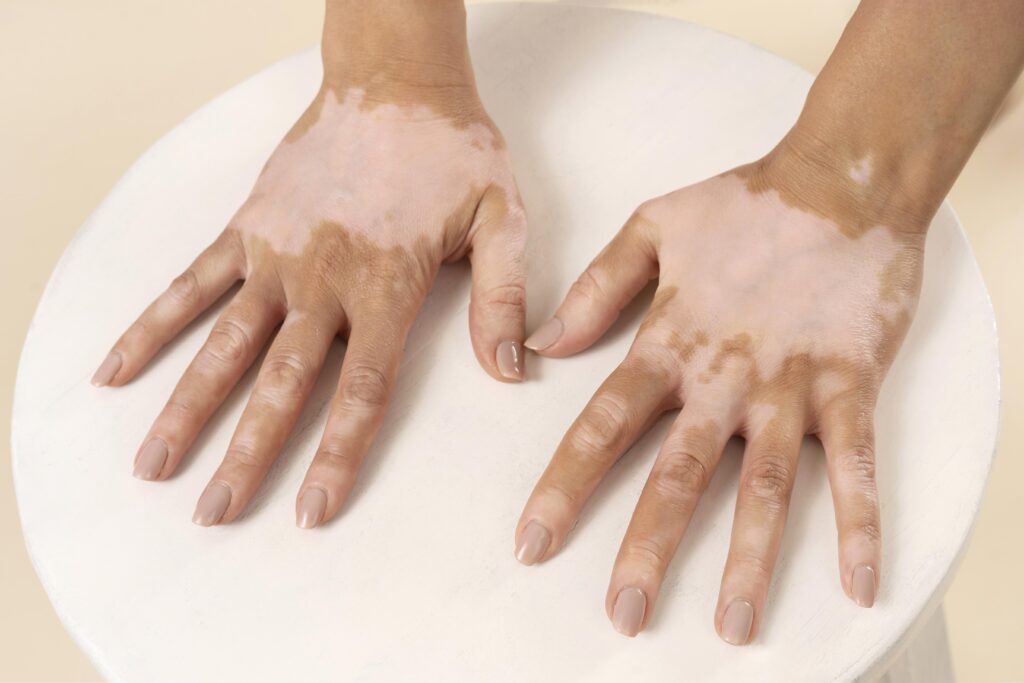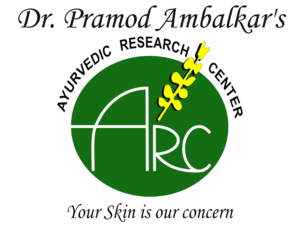- drambalkar@yahoo.co.in
- Mon - Sunday 10:00 AM - 02:00 PM
How To Treat Vitiligo Naturally
If you’re in search of home remedies for white patches on the face, it’s likely that you or someone you care about is dealing with the symptoms of Vitiligo, a condition that manifests as depigmented white patches on the skin. While home remedies may offer some relief, it’s crucial to prioritize proper vitiligo treatment for effective and timely management.
Vitiligo is a skin disorder characterized by the loss of skin pigmentation in specific areas, resulting in the appearance of white patches. While there is no known cure for vitiligo, there are natural and holistic approaches that may aid in its management and promote skin health. It’s important to understand that the outcomes can vary among individuals, and it’s advisable to seek guidance from a healthcare professional before attempting any natural remedies.

Here are some natural methods to address vitiligo:
Diet
Eating a healthy diet that is rich in fruits, vegetables, and whole grains is important for overall health and well-being. It may also help to improve the appearance of the skin in people with vitiligo. Some specific foods that may be beneficial for people with vitiligo include:
- Fruits and vegetables: Fruits and vegetables are rich in antioxidants, which can help to protect the skin from damage. Some particularly good choices for people with vitiligo include berries, citrus fruits, tomatoes, and leafy green vegetables.
- Whole grains: Whole grains are a good source of fiber, which can help to improve digestion and gut health. A healthy gut is important for overall health and well-being, and it may also help to improve the appearance of the skin.
Supplements
Some people with vitiligo may find it beneficial to take certain supplements. Some supplements that have been shown to be helpful for people with vitiligo include:
- Vitamin D: Vitamin D is important for skin health, and some studies have shown that people with vitiligo may have low levels of vitamin D. Taking a vitamin D supplement may help to improve the appearance of the skin in people with vitiligo.
- Zinc: Zinc is a mineral that is essential for skin health. Some studies have shown that people with vitiligo may have low levels of zinc. Taking a zinc supplement may help to improve the appearance of the skin in people with vitiligo.
- Ginkgo biloba: Ginkgo biloba is an herb that has been shown to improve circulation. Improved circulation to the skin may help to repigment the affected areas in people with vitiligo.
Home remedies
There are a number of home remedies that have been used to treat vitiligo. Some of the most common home remedies for vitiligo include:
- Turmeric: Turmeric is a spice that contains curcumin, a compound with anti-inflammatory and antioxidant properties. Some studies have shown that turmeric may be helpful for repigmenting the skin in people with vitiligo.
- Papaya: Papaya contains papain, an enzyme that is thought to promote skin regeneration. Some people with vitiligo have found that applying papaya to the affected areas helps to improve the appearance of their skin.
- Red clay: Red clay is rich in copper, a mineral that is important for skin health. Some people with vitiligo have found that applying red clay to the affected areas helps to improve the appearance of their skin.
It is important to note that more research is needed to confirm the effectiveness of natural treatments for vitiligo. Additionally, some natural treatments may interact with other medications that you are taking. It is important to talk to your Ayurvedic Skin Specialist doctor before starting any new natural treatment for vitiligo.
Other tips
In addition to natural treatments, there are a number of other things that you can do to manage vitiligo, including:
- Protect your skin from the sun: Sun exposure can worsen the appearance of vitiligo. It is important to protect your skin from the sun by wearing sunscreen, protective clothing, and a hat whenever you are outdoors.
- Reduce stress: Stress can trigger vitiligo flare-ups. It is important to find healthy ways to manage stress, such as exercise, yoga, or meditation.
- Join a support group: Joining a support group for people with vitiligo can be a great way to connect with others who understand what you are going through. Support groups can provide information and support, and they can help you to feel less alone.
If you are interested in trying natural treatments for vitiligo, it is important to talk to your doctor first. Your doctor can help you to determine which treatments are safe and effective for you.
Conclusion
while there are natural approaches and home remedies that may offer some relief for vitiligo, it’s important to emphasize that there is no known cure for this skin condition. Managing vitiligo should always be done in consultation with a healthcare professional who can provide guidance tailored to your specific needs. A balanced diet, supplements like vitamin D and zinc, and certain home remedies such as turmeric, papaya, and red clay may be considered, but their effectiveness varies from person to person and requires further research. Additionally, protecting your skin from the sun, reducing stress, and seeking support through vitiligo support groups are essential components of holistic vitiligo management. Always consult with your doctor before attempting any natural treatments to ensure they are safe and appropriate for your condition.

Get in Touch with us Today to Begin Your Journey of Transformation

Contact Us
- Dr.Ambalkars Aayurvedic Research Centre, ARC Bhavan, Vijay Vihar Complex, Evershine City, Last Stop, Vasai (E)
- drambalkar@yahoo.co.in
- +91 9320193201
- +91 9766362776

